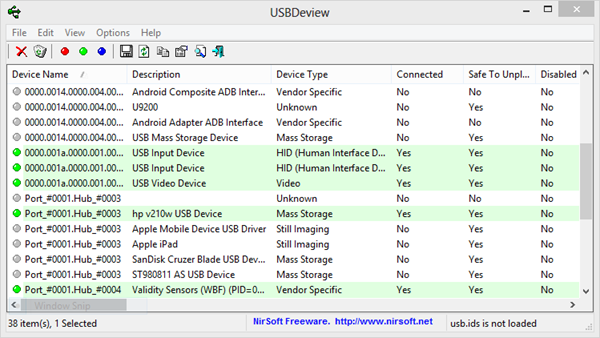The Universal Serial Bus interface, more commonly known as the USB, is perhaps the most useful invention in the world of computers and technology after the floppy disk. The bus provides a standardized media and input/output interface that has truly revolutionized how removable devices and other peripherals connect and interact with computers all over the world. Today, USB-interface is used not only for removable storage media, but also for the likes of printers, human interface devices (like mice and keyboards), gamepads, speakers, device connections, and lots of other cool gadgets that you’d just like to have sitting around on your desk while you work. If you really think about it, you’ll hardly find yourself using any other port on your PC or laptop more than the USB ports.
From time to time, you may want to keep a track of what USB devices get connected to your computer, their serial numbers, plug-in/removed date and time, and several other pieces of information that may help keep track of your USB connections. At still other times, you may want to remove one particular device from the list of recognized devices, block off access altogether, or disable all ports completely for a certain time frame, especially on a remote computer that you manage within your network. For all such scenarios, and more, recognized freeware developer NirSoft has come up with a portable, standalone utility for Windows by the name of USBDeview. Weighing at a a few mere kilobytes, this application lists down all the current and previously-connected USB devices that have ever been attached to your Windows-based PC.
The information displayed for each device is pretty intense, and ranges from the device’s name and description to things like device type, serial number, connected port, vendor ID, product ID, date and time of connection (and removal), service name and description, driver filename, power being utilized, USB interface version, and still several others. Indeed, I have never seen one tool aggregating so much information under its hood ever before.
Apart from displaying information, the software also lets you run some diagnostics on your USB ports, like speed tests, as well as manipulating parameters like allowing Auto Play for certain devices and disabling for others. Then, thanks to the remote computer connection, you can monitor USB host on any machine that’s far away from you but allows your administrator access. Finally, the application supports a plethora of CLI commands, which can be even more useful to advanced users.
USBDeview is available in a variety of languages other than English, and can be translated to even more if you want to use it in your native tongue. It’s freeware, and available for download at the source link below.
(Source: USBDeview by NirSoft)
You can follow us on Twitter, add us to your circle on Google+ or like our Facebook page to keep yourself updated on all the latest from Microsoft, Google, Apple and the web.

